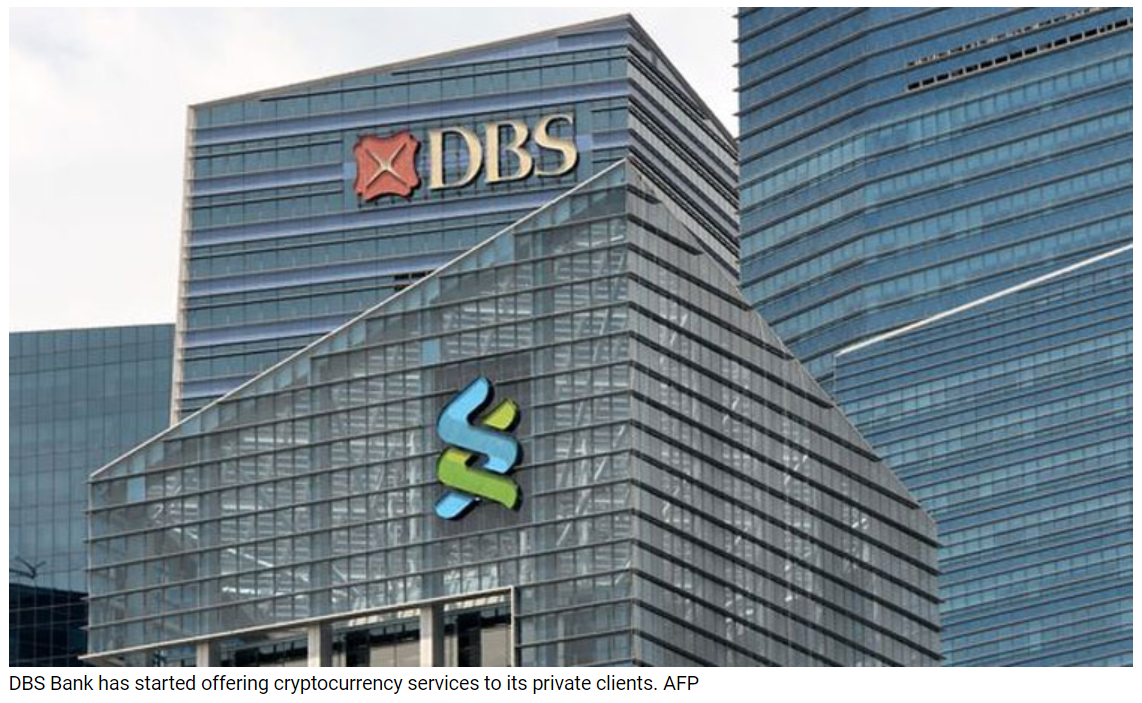DBS Bank opens crypto trading service to clients
In a first for Asia, Singapore-based DBS Bank announced it would start allowing its private clients to invest in and trade cryptocurrencies with a trust service backed by the bank.
The bank will only allow transactions for a small group of the most popular cryptocurrencies: Bitcoin, Ether, Bitcoin Cash and XRP.
Last December, DBS launched its Digital Exchange System, which allowed institutional and accredited investors the ability to raise funds through digital security tokens and trade digital assets, including cryptocurrencies, on the secondary market.
The bank’s new trust service will allow private clients to open a portfolio of cryptocurrencies with DBS, which will safeguard and manage the cryptocurrencies for the clients.
Cryptocurrencies have taken centre stage globally after the market rose dramatically during the pandemic, increasing interest in decentralised money as fiat currencies struggled with a declining economy.
However, governments, including Cambodia’s, have been slow to regulate the industry and appear to be taking a wait-and-see approach.
While governments have sat on the sidelines, some big names in banking, including Barclay’s and Goldman Sachs, have stepped in to offer cryptocurrency services, with DBS being the latest to jump on the bandwagon.
Cambodian banks and institutions have shown a willingness to adopt digital assets and payment applications but have resisted cryptocurrencies.
Bakong, the government’s digital payment platform, offers blockchain based transactions.
Many digital transaction services are starting to employ blockchain technology including Bakong, DBS’ Digital Exchange System and TADA, a ride-hailing and delivery platform in Cambodia that uses the technology to transfer data and process payments within its service.
According to a 2019 report by Tilleke and Gibbons, a Phnom Penh-based law firm, trading, buying and selling bitcoin is illegal without a licence in Cambodia.
As of now, there is no way to obtain a licence. When asked if it was possible to request a licence, Association of Banks Cambodia (ABC) president In Channy confirmed that there is no process as of yet and said there are no current plans to regulate cryptocurrencies.
“There is no regulation in place for this yet – and it means it’s not allowed,” he said.
According to the law firm’s report, the NBC and SECC haven’t appeared eager to embrace cryptocurrencies.
Cryptocurrencies are shunned by many investors, financiers and governments alike for several reasons: They aren’t backed by assets, they’re decentralised and they’re extremely hard to regulate.
The blockchain technology that powers cryptocurrency ensures security and anonymity and has been traced to black market transactions, another reason why most governments have not embraced it.
Cryptocurrency backers say it’s valuable because of its decentralised nature and the ability to transfer it anytime, anywhere, without needing a middleman. Some view it as a hedge against inflation, choosing to store their cash in crypto instead of holding fiat currency.
Other countries in the region have started taking notice of the surge in cryptocurrency use.
Vietnam’s Ministry of Finance organised a working group on March 30 to research how to effectively implement legislation and regulation for the industry.
According to business consultant firm Dezan Shira and Associates, “using, supplying and issuing cryptocurrencies” is illegal in Vietnam.
“However, possessing, trading and investing in cryptocurrencies is not forbidden nor permitted; it is only tolerated for the time being.”
Last month, China launched the digital yuan, the world’s first official government-backed digital currency that uses blockchain technology.
It is currently in its testing phase and uses similar technology to Bitcoin, but one key difference is that the Chinese government decides who can use it and it has the ability to track each transaction.
Another key difference is that the digital yuan enjoys all the same privileges of the physical yuan, but it’s recorded on a blockchain instead of printed.
The digital yuan is expected to increase the adoption of digital payments even further in China as cashless payments become the new norm and could have global ramifications if it becomes more widely adopted and used for international transactions.
Source: https://www.khmertimeskh.com/50857782/dbs-bank-opens-crypto-trading-service-to-clients/


 Thailand
Thailand




